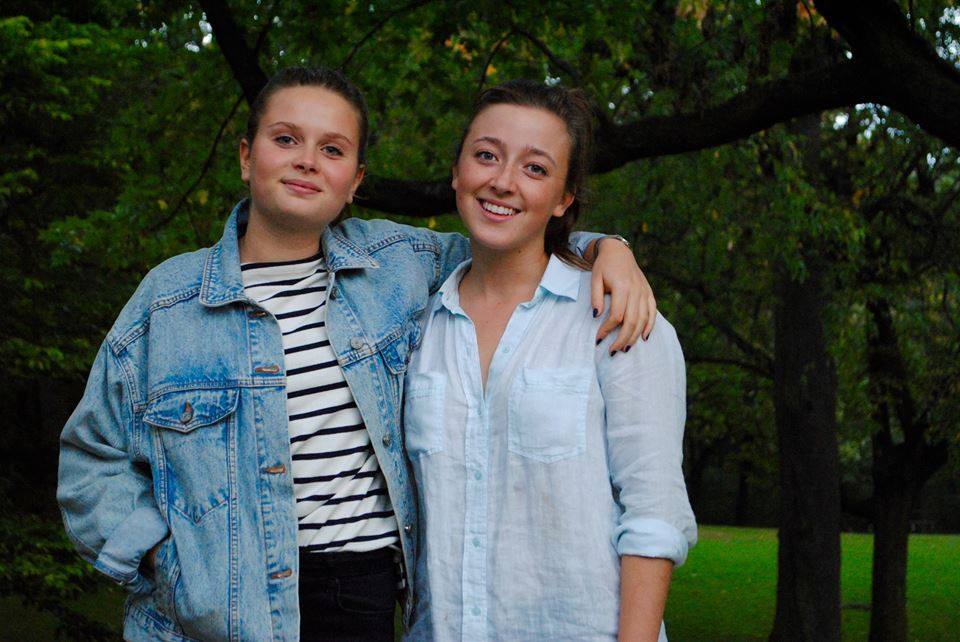Chloé Pronovost-Morgan and Julia Coste are U2 McGill students in the Faculty of Arts. They are also the creators of Montreal’s newest social welfare initiative, Monthly Dignity. The Bull & Bear had the opportunity to sit down with Chloé and Julia to discuss their new project.
The Bull & Bear (B&B): Can you tell us a bit about yourselves?
Chloé Pronovost-Morgan (CPM): I’m a U2 Arts student in Psychology. I’m from Montreal. I grew up here.
Julia Coste (JC): I’m also in Arts, also in U2. I’m in Political Science and International Development, and I’m half-French and half-Polish.
B&B: How would you describe Monthly Dignity to someone who hasn’t heard about it yet?
JC: I would describe it as a social welfare initiative that [aims to] distribute feminine hygiene products [to] homeless women in Montreal. The problem we are trying to address is how, on the one hand, feminine hygiene products are so vital, and how on the other hand, they are so expensive and therefore very inaccessible to a lot of individuals. We’re trying to address that problem.
CPM: It’s also about raising awareness to the phenomena of both homelessness and menstruation, which are extremely taboo in our society. When you combine them together, the result is a void – a problem that is entirely overlooked. So, overall, Monthly Dignity tries to address two taboos in one project, but seeks to do so in a very practical way.
B&B: What is the primary goal of Monthly Dignity? How do you go about achieving this goal?
CPM: One of our main goals is achieved through a very simple equation: raise funds, purchase products in bulk, and then distribute them to homeless women in Montreal. In order to raise funds, we have crowd-funding platforms, on-campus events, and we hope to eventually host larger events that gather more people than only McGill students. For the bulk purchase of the products, we order online, and for the distribution, right now we’re collaborating with a homeless women’s shelter that hosts over 550 women per year. We hope to expand that horizon, knowing that not all homeless women go to that shelter, or go to any shelter at all. We also hope to seek donations and partnerships, which we’ve been able to do so far with OrganiCup. They make menstrual cups and have sent us 100 in exchange for promoting their product on campus and on our Facebook page.
JC: Once we are incorporated [as a Canadian non-profit organization], we’re looking to have institutions, companies, or banks [donate].
B&B: What prompted the idea to start Monthly Dignity?
JC: The idea came to me over the summer. I was travelling with my family and was on my period, wanting to complain. As I had this desire, I kind of realized my own mistake and privilege. First of all, being able to travel and having my family with me, but also having access to the products that make the whole situation more comfortable. I had access to everything that I needed, and I realized that other people just don’t, and it must be so much more tough. Even in these privileged situations, we complain about how inconvenient and annoying having your period can be. That made me think how it could be exponentially worse for someone who doesn’t have access to basic products. I saw that in Montreal, the issue wasn’t addressed, so I talked to Chloé and together we figured out how we’d make this idea a concrete reality. Since this Fall semester we’ve been working on the project. You would think that such a basic need would be addressed by the government. I think people have the tendency to think of Canada as a welfare state that takes really good care of its citizens, and though it does on many fronts, there is still a demand for the provision of feminine hygiene products to disadvantaged women in Montreal.
CPM: I think that once we realize that it exists, nobody can say, “No, this is not a problem.” That’s why it must be addressed.
B&B: What preliminary work was required behind the scenes before launching Monthly Dignity?
CPM: We wanted to make sure an initiative like ours didn’t already exist in Montreal, gain more insight into how extensive the issue was, and get our facts straight. We found out that there are approximately 720 homeless women in Montreal, but there have to be more than that because it’s hard to do a census. We also sent a bunch of emails seeking donors, collaborations, and sponsors.
JC: We wanted to make sure it was something necessary, so we contacted the shelters and asked if it was something they needed. They were excited that we were taking this initiative and were willing to help guide us before Monthly Dignity even existed. Initially, we were set on menstrual cups because they’re environmentally-friendly, health-friendly, and are reusable (with a lifespan of up to 2 years), which makes them a sustainable option. After talking to them, they told us that menstrual cups are good, but we need to consider that some homeless women are not in a state of mind where they want to be educated about something they need to take care of. We took that into consideration, and looked into the more traditional options. Afterwards, it was a question of fine-tuning our message and goal, which happened when we built our website and through hours of discussion.
CPM: Finally, we contacted other clubs, started working with the McGill Women in Leadership Students’ Association, and created a crowdfunding platform before launching. We’ve raised over $2,000, will be making our first bulk order this Monday, and distributing it this Thursday at the Salvation Army Centre. The Centre is hosting a lunch with over 100 homeless women to whom the products we’ve purchased will be distributed. The rest of the products will stay within the shelter and will be given to newcomers.
B&B: Could you describe the public response you expected prior to announcing Monthly Dignity?
CPM: Personally, I was not expecting that much of a positive response. I was expecting some people to ask “Why? Out of everything, why are you focusing on this? Periods are gross, this makes me cringe.” But we haven’t heard much of that. I expected trolls on our Facebook page. I thought that be would get torn apart, but honestly the opposite happened. Within two weeks, we’ve already reached 600 likes on Facebook, and reached our online fundraising goal of $1,500 in three days. People who encountered Monthly Dignity and agreed with the need for this initiative “liked” it, and those who were less interested didn’t manifest their discontent.
JC: I guess I was a bit more hopeful. That’s why I chose to bring the idea to McGill instead of back home to Europe. I was very hopeful with the McGill community being so liberal, understanding, and inclusive. I thought that the students here would really pick it up, but I was still surprised by the extent of the positivity we’ve gotten. Not only from students, but even individuals outside of McGill who have contacted us, offering help or even just congratulating us. Also, it’s hard to deny that a problem exists. Concretely, there are over 720 homeless women in Montreal, and most of them can’t access feminine hygiene products, which ultimately compromises both their physical and mental health. The fact that a biological phenomenon should strip individuals of their dignity is nonsensical, and people get that once they think about it.
B&B: Do you have any partnerships, sponsors, or organizations helping you achieve your goals?
CPM: Given that we didn’t really exist when we were seeking out sponsorships, OrganiCup is our only partner at the moment. OrganiCup makes menstrual cups, and we had initially talked about how our initiative would be centred around this. OrganiCup was one of the companies we contacted in the early days of our project, and right away they responded saying, “It’s a great initiative. We’ll send you products.”
JC: It’s funny because they’re from Denmark, and they were the most positive response we’ve gotten. They were so helpful and sent everything right away, whereas the Canadian and American companies were kind of reluctant. I guess it was surprising that a company so far away that didn’t have to get involved chose to help. We’re trying to make everything with the Salvation Army as consistent and sustainable as possible. We want the women to know that they can rely on these products. Other donations they’ve gotten so far have been a few products every once in awhile, and they don’t really know how they’ll deal with a period next month. We’re also talking to the Native Women’s Shelter of Montreal, and they’re interested in collaborating. Once we’ve established that consistency, we’re looking to expand.
B&B: Where can someone find out more about Monthly Dignity? Are there currently any opportunities to join the team?
CPM: The most comprehensive source of information is our website. You can also find out more about Monthly Dignity on the Facebook page, and you can find the link to the website and the donation platform on the page. If someone wants to get involved, they can message our page on Facebook or contact us by email at monthlydignity@gmail.com.
JC: A lot of people applied for the executive positions. We’ve gone through our whole process of selection, and yesterday we sent out the results for our exec team. We really wanted to make sure people were dedicated and were willing to take the time to do this job, so we only created five positions. We were actually only looking to create four positions, but created a fifth because there were so many amazing applications. We saw how many people wanted to get involved, so we’re creating a Monthly Dignity Volunteers Community. A lot of people have asked to help, or lend a hand without having to commit to anything, which is totally understandable, so we’ll be adding those people to a volunteer base.
B&B: How can people contribute to Monthly Dignity?
JC: This Thursday, we’ll be working with McGill Women in Leadership and tabling in front of Leacock 132 for a donation drive. For example, if someone has switched to a menstrual cup and has products they’ll probably never use again, just come by and donate them.
CPM: Anyone can also just go to the pharmacy, get a box of tampons or pads, and donate it. There’s also a monetary donation option on our fundraising platform.That’s always appreciated: a tampon, or a dollar, anything.
B&B: In the two weeks since Monthly Dignity launched, what has been the most difficult obstacle so far?
JC: It’s just been a lot in very little time. It’s so exciting that it’s hard not to get addicted to our project. We really want to spend so much time on it – I love answering the messages and updating the Facebook page, but unfortunately, it’s not a full time job.
CPM: On my part, the biggest challenge has been having the stamina to say, “the project has started, and now we need to make something out of it.” It needs to continue and it needs to be sustainable, and we need to figure out how we’re going to do that. The initial response was amazing, but we want to keep that enthusiasm, and I think that will definitely be a challenge.
B&B: Is there anything else you want to add?
JC: We did receive a message asking about trans men. I wanted to make it clear that for now, we’re working with women’s shelters, and trans men don’t usually go to women’s shelters. We know that these people have their periods too but don’t identify as women, and therefore don’t go to the women’s shelters. We are aware and are trying to expand our project, potentially making distribution available in public spaces. That’s our long-term goal.
For more information about or to get involved with Monthly Dignity visit their website or Facebook page.








